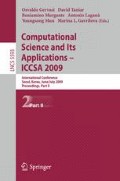Abstract
The performance of space time block code (STBC) pulse position modulation-time hopping (PPM-TH) ultra-wide band (UWB) systems with double binary turbo coding is analyzed and simulated in multi-user environments. The channel model is considered as a modified Saleh and Valenzuela (SV) model which was suggested as a UWB indoor channel model by the IEEE 802.15.SG3a in July 2003. In order to apply the STBC scheme to the UWB system considered in this paper, the Alamouti algorithm for real-valued signals is employed because UWB signals with the pulse modulation have the type of real signal constellation. The system performance is evaluated in terms of bit error probability. From the simulation results, it is demonstrated that the double binary turbo coding technique offers considerable coding gain with reasonable encoding and decoding complexity. Also, it is demonstrated that the performance of the STBC-UWB system can be substantially improved by increasing the number of iterations in the decoding process for a fixed code rate. Also, it is confirmed that the double binary turbo coding and STBC schemes are very effective in increasing the number of simultaneous users for a given bit error probability requirement. The results of this paper can be applied to implement the down-link of the PPM-TH UWB system.
Access this chapter
Tax calculation will be finalised at checkout
Purchases are for personal use only
Preview
Unable to display preview. Download preview PDF.
References
Telatar, E.: Capacity of Multiantenna Gaussina Channels. European Transactions on Telecommunications 10(6), 585–595 (1999)
Foschini, G.J., Gans, M.J.: On Limits of Wireless Communicatinos in a Fading Environment When Using Multiple Antennas. Wireless Personal Communications 6, 311–335 (1998)
Tarokh, V., Seshadri, N., Calderbank, A.R.: Space Time Codes for High Data Rate Wireless Communication: Performance Criterion and Code Construction. IEEE Transactions on Information Theory 2, 744–765 (1998)
Alamouti, S.M.: A Simple Transmit Diversity Technique for Wireless Communications. IEEE Journal of Selected Areas on Communications 16(8), 1451–1458 (1998)
Foschini, G.J.: Layered Space-Time Architecture for Wireless Communicatinos in a Fading Environment When Using Multiple Antennas. Bell Laboratorys Technical Journal 6(2), 41–59 (1996)
Wicker, S.B.: Error Control Systems for Digital Communication and Storage. Prentice-Hall, Englewood Cliffs (1995)
Lin, S., Costello, D.J.: Error Control Coding. Prentice (2004)
Berrou, C., Glavieux, A., Thitimajshima, P.: Near Shannon Limit Error-Correcting Coding and Cecoding: Turbo Codes 1. In: IEEE ICC 1993, Geneva, Switzerland (1993)
3GPP2. C.S0002-D, v.2.0 (2005), http://www.3gpp2.org
3GPP, TS36.212, v.1.3.0 (2007), www.3gpp.org
Douillard, C., Berrou, C.: Turbo Codes with Rate-m/(m+1) Constituent Convolutional Ccodes. IEEE Transactions on Communications 53(10), 1630–1638 (2005)
Berrou, C., Douillard, C., Jezequel, M.: Multiple Parallel Concatenation of Circular Recursive Systematic Convolutional (CRSC) Codes. Annals of Telecommunications 54(3-4) (1999)
IEEE 802.15.SG3a: Channel Modeling Sub-Committee Report Final. In: IEEE P802.15-02/490r1-SG3a (2003)
Tarokh, V., Jafarkhani, H., Calderbank, A.R.: Space-Time Block Coding for Wireless: Performance Results. IEEE Journal of Selected Areas on Communications 17(3), 451–460 (1999)
Soleymani, M.R., Gao, Y., Vilaipornsawai, U.: Turbo Coding for Satellite and Wireless Communications. Kluwer Academic Publishers, Dordrecht (2002)
Robertson, P., Hoeher, P., Villebrun, E.: Optimal and Sub-Optimal Maximum a Posteriori Algorithm Suitable for Turbo Decoding. European Transactions on Telecommunications 8(2), 119–125 (1997)
Hagenauer, J., Offer, E., Papke, L.: Iterative Decoding of Binary Block and Convolutional Codes. IEEE Transactions on Information Theory 42(2), 429–445 (1996)
Author information
Authors and Affiliations
Editor information
Editors and Affiliations
Rights and permissions
Copyright information
© 2009 Springer-Verlag Berlin Heidelberg
About this paper
Cite this paper
Kim, E.C., Kim, J.Y. (2009). Performance of STBC PPM-TH UWB Systems with Double Binary Turbo Code in Multi-user Environments. In: Gervasi, O., Taniar, D., Murgante, B., Laganà, A., Mun, Y., Gavrilova, M.L. (eds) Computational Science and Its Applications – ICCSA 2009. ICCSA 2009. Lecture Notes in Computer Science, vol 5593. Springer, Berlin, Heidelberg. https://doi.org/10.1007/978-3-642-02457-3_19
Download citation
DOI: https://doi.org/10.1007/978-3-642-02457-3_19
Publisher Name: Springer, Berlin, Heidelberg
Print ISBN: 978-3-642-02456-6
Online ISBN: 978-3-642-02457-3
eBook Packages: Computer ScienceComputer Science (R0)

